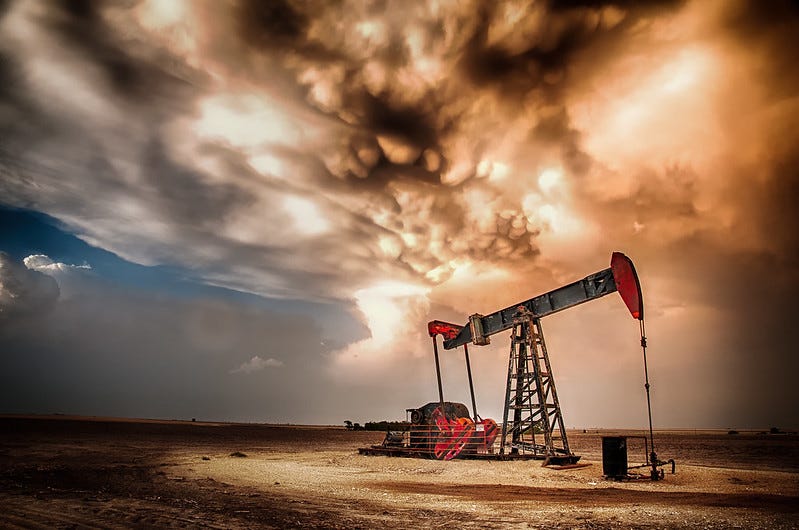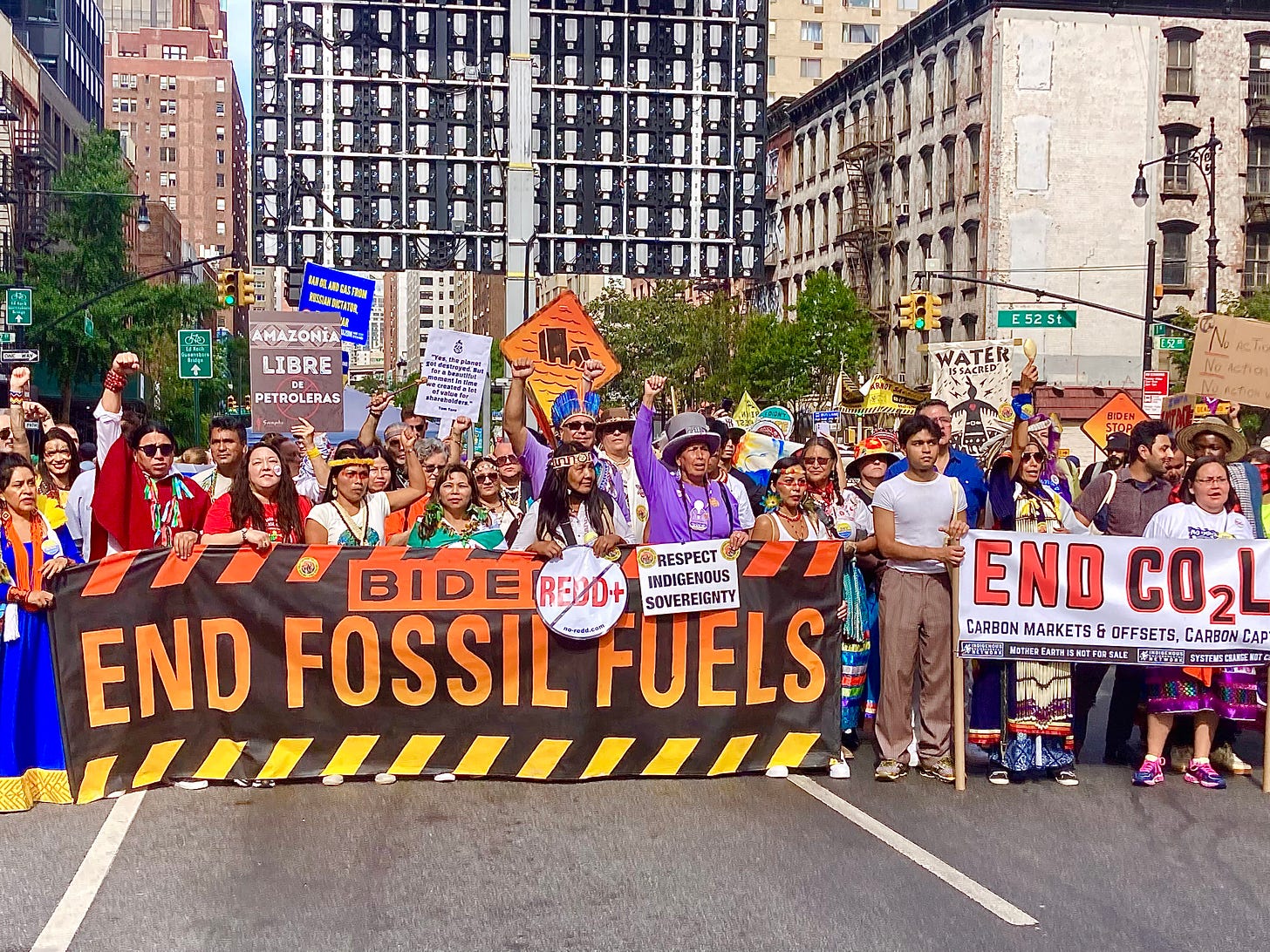“Fossil Fuels are Killing Us,” Scientists Warn in New Report
Latest warning comes as Trump administration doubles down on dirty energy that fuels interlinked crises threatening the “stability of life on Earth.”
Credit: Lane Pearman via Flickr, CC BY 2.0
Severe asthma, birth defects, premature death, and other adverse health impacts; pervasive plastic pollution contaminating water, air, soil, and our bodies; accelerated species extinctions and ecosystem degradation; longstanding environmental racism; climate breakdown upending the foundation that allowed human civilization to flourish – all of these intersecting problems are rooted in the extractive fossil fuel economy that inflicts enormous damage on a planetary scale. Extending the fossil fuel era is ultimately a suicide mission, and urgent action is needed to phase out coal, oil, and gas in order to mitigate extensive harms to human and environmental health.
That is the message of a new review article titled “Scientists’ warning on fossil fuels,” published today in the peer-reviewed journal Oxford Open Climate Change.
The article synthesizes the overwhelming scientific evidence on the harms stemming from fossil fuels and explains how they are drivers of not only the climate emergency but also crises of public health, biodiversity loss, environmental injustice, and plastics and agrochemical pollution. These interlinked crises, scientists warn, “jeopardize the breadth and stability of life on Earth.”
“Fossil fuels are responsible for millions of premature deaths, trillions of dollars in damages, and the escalating disruption of ecosystems, threatening people, wildlife, and a livable future,” the article asserts.
“The science can’t be any clearer that fossil fuels are killing us,” said Shaye Wolf, climate science director at the Center for Biological Diversity and lead author of the new paper. “Oil, gas and coal will continue to condemn us to more deaths, wildlife extinctions and extreme weather disasters unless we make dirty fossil fuels a thing of the past.”
Scientists have been warning about these dangers for decades, and their forecasts have become increasingly dire as atmospheric concentrations of heat-trapping gases continue climbing and global temperatures continue spiking and smashing previous records. In the 2024 state of the climate report, scientists write: “We find ourselves amid an abrupt climate upheaval, a dire situation never before encountered in the annals of human existence.” The situation is “a global emergency, beyond any doubt,” they explain, with “much of the very fabric of life on Earth” at risk. And these scientists, like doctors issuing a prescription or treatment plan for a disease, are very clear on what must be done. “Rapidly phasing down fossil fuel use should be a top priority,” they write.
The new warning published today repeats the clarion call to swiftly transition away from fossil fuels, and it details how these fuels are worsening a range of problems from public health harms to prolific petrochemical pollution and intensifying climate disasters.
To briefly summarize:
Public Health Harms
Coal, oil, and gas are dirty substances and their extraction and use result in production of toxins and pollutants that are harmful to human health. Workers in oil and gas fields or coal mines or people who reside in close proximity to fossil fuel infrastructure are particularly at risk. “Residing near oil and gas wells is associated with higher risk of adverse health outcomes for people of all ages, including preterm birth, impaired fetal growth, childhood asthma, mental health disorders, gestational hypertension, migraine headaches, and death,” the new article explains. Use of fossil fueled appliances like gas stoves and petrochemical products can also expose people to endocrine-disrupting chemicals and toxins such as benzene. And combusting fossil fuels generates air pollution, which leads to 8.7 million premature deaths each year globally and about 350,000 premature deaths each year in the US.
“Fossil fuel pollution impacts health at every stage of life, with elevated risks for conditions ranging from premature births to childhood leukemia and severe depression. We’ve got to work fast to end fossil fuel operations near our homes, schools and hospitals and trade fossil fuel infrastructure for healthy, clean energy,” said David J.X. González, co-author of the review article and an assistant professor of environmental health sciences at the UC Berkeley School of Public Health.
Petrochemical Pollution
Plastics and agrochemicals are the top non-energy uses of fossil fuels, accounting for more than 75% of the petrochemicals produced globally. Petrochemicals are chemical compounds made from fossil fuel feedstocks. They are a growing source of oil and gas usage and the petroleum industry is betting on petrochemical expansion to boost their profits as demand for their products in the energy sector (such as transportation fuel) is expected to wane. Plastic production has skyrocketed over the last 50 years and with it, plastic waste. Plastic fragments – microplastics – have been found in even the most remote places on Earth, and within our bodies. We are effectively creating a plasticized world, degrading the environment and imperiling human health. Plastics pollute at every stage of their lifecycle. They contain thousands of chemical additives, and since they are derived from fossil fuels they also emit greenhouse gases.
Fossil fuels are also used to make agricultural chemicals – pesticides and nitrogen fertilizers, which come with their own health and ecological harms. To read more about the issues with agrochemicals and how they are inextricably linked to fossil fuels, see this 2022 report on “fossil fertilizers” that I co-authored.
Biodiversity Loss
Widespread use of fossil fuel-derived pesticides is driving a decline in biodiversity, while fertilizer pollution is choking aquatic ecosystems and plastics are decimating marine life and may even outweigh fish in the oceans by midcentury. The climate crisis is also becoming a major driver of species extinction, with an estimated one million plant and animal species threatened with extinction globally. “Scientists have called for the urgent transformation of our energy system away from fossil fuels to prevent a mass extinction event,” the review article notes.
Climate Crisis
Burning coal, oil, and gas releases heat-trapping gases that are destabilizing Earth’s climate system, raising surface temperatures and sea levels and supercharging extreme weather. This is not some distant threat – it is happening now, and the consequences are profound. As scientists write in the new article: “The climate emergency is causing premature deaths estimated in the millions, endangering public health, imperiling ecosystems, costing trillions in economic damages causing mass displacement and migration, threatening economic, food, and energy security, and increasing overall suffering in the United States and around the world.”
Environmental Injustice
From petrochemical pollution to climate impacts, the harms of the fossil fuel system disproportionately fall upon marginalized communities, including people of color and the world’s poor and most vulnerable. “Decades of discriminatory policies, such as redlining, have concentrated fossil fuel development in Black, Brown, Indigenous and poor white communities, resulting in devastating consequences,” said article co-author Robin Saha, an associate professor at the University of Montana. “For far too long, these fenceline communities have been treated as sacrifice zones by greedy, callous industries. The most polluted communities should be prioritized for clean energy investments and removal and cleanup of dirty fossil fuel infrastructure.”
For years, Indigenous leaders, environmental justice communities, youth activists, and civil society groups have been calling out the abuses of the fossil fuel industry and its enablers and pushing for a just transition away from extractive fossil fuels towards regenerative renewable energy. The head of the United Nations, Secretary General António Guterres, has also sharply rebuked the fossil fuel industry in recent years. He has called the industry’s core product “our core problem” and “incompatible with human survival.”
“We need a renewables revolution, not a self-destructive fossil fuel resurgence,” Guterres said in a February 2023 speech.
And yet, the fossil fuel industry and its political allies seem hell-bent on obstructing the clean energy transition and ensuring such a resurgence. That is especially evident right now in the US under the second Trump administration, which has declared an “energy emergency” intended to boost oil and gas extraction and has attacked climate science and axed clean energy programs. In a recent speech at the CERAWeek energy industry conference in Houston, the Trump administration’s Secretary of Energy Chris Wright, who formerly headed a fracking company, downplayed the severity of the climate crisis, referring to it as merely a “side effect of building the modern world.”
Such a statement flies in the face of the scientific evidence and warnings that the fossil fueled climate emergency jeopardizes a livable future and threatens the “very fabric of life on Earth.” But it is consistent with the industry narrative that has positioned fossil fuels as essential to humanity, rather than a risk to our collective survival, and has long distorted or misrepresented climate science. A big reason why our society has not moved sooner to transition away from fossil fuels is because the industry has waged a massive, decades-long disinformation campaign to stifle public support for a change along with a successful political and lobbying operation to capture government officials and block climate policies and regulations.
“Action to speed the transition from fossil fuels to clean, renewable energy could not be more urgent,” the scientists who authored the new review article write. But the “key barrier,” they say, continues to be the “lack of political will which has been stymied by the entrenched political and financial influence of the fossil fuel industry.”
Overcoming or challenging the industry’s enormous influence will likely require a strong and sustained people’s movement, which has already started to build. “Grassroots social movements are essential to push governments to implement fossil fuel phaseout and just transition policies that protect the public interest, limit the influence of the fossil fuel industry, and hold fossil fuel polluters accountable for their damages and deception,” the article explains.
Indigenous activists led the “March to End Fossil Fuels” in New York City in September 2023. Credit: Dana Drugmand
Accountability for the fossil fuel industry, the scientists say, should be part of the equation for delivering a just transition. In the US, accountability initiatives are underway with dozens of municipalities and states bringing climate liability lawsuits against major oil companies, and some states adopting or considering adopting “climate superfund” legislation that would require the world’s largest fossil fuel producers to help foot the bill for climate damage and adaptation costs. Fossil fuel companies are of course fighting these liability efforts in the courts, and according to recent reporting from the Wall Street Journal, they are also seeking help from Trump and Congress to help evade accountability.
It remains to be seen whether their attempted liability dodges will be successful. In the meantime, the scientists authoring the review article are clear on what needs to happen: “The necessary transition away from fossil fuels will provide innumerable societal and planetary benefits,” they write, “and forge a path forward to sustaining life on Earth.”




Those scientists are telling just half the truth. The other half which is actually killing the planet, the vast working class and causing a mass extinction is Capitalism. Those scientists are mostly situated within high income countries which consume excessively high amounts of energy. What are they telling us again? Be very careful.